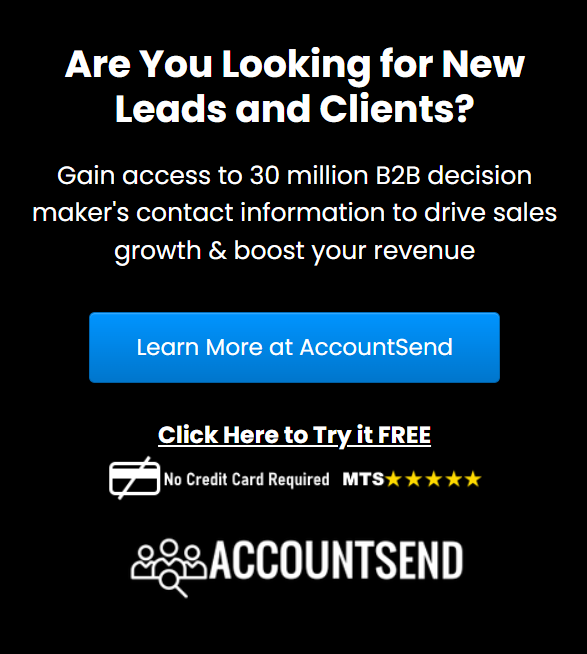The Pros and Cons of Buying Sales Leads: Making Informed Decisions
Article by Jonathan Bomser | CEO | AccountSend.com

DOWNLOAD THE PROS AND CONS INFOGRAPHIC HERE
Pro: Time and Effort Savings
One of the significant advantages of buying sales leads is the time and effort savings it offers. Instead of spending resources on extensive lead generation efforts, you can access a ready-made database of potential customers. This allows your sales team to focus their energy on nurturing leads and closing deals, increasing overall productivity.
Pro: Access to Targeted and Qualified Leads
When you purchase sales leads, you gain access to a database of targeted and potentially qualified leads. This can be particularly beneficial for businesses operating in niche industries or targeting specific demographics. By utilizing a reputable sales leads provider, you can reach prospects who are more likely to be interested in your products or services, increasing your chances of conversion.
Pro: Increased Sales Opportunities
Buying sales leads can open up new sales opportunities that may have been difficult to uncover through other means. With a larger pool of potential customers, you have a higher probability of finding prospects who are ready to make a purchase. This can result in increased sales and revenue for your business, providing a boost to your bottom line.
Con: Potential Lack of Quality and Relevance
One of the main drawbacks of buying sales leads is the potential lack of quality and relevance. Not all sales leads databases are created equal, and there is a risk of purchasing outdated or inaccurate information. It's crucial to research and choose reputable sales leads providers that offer high-quality and up-to-date data to minimize this risk.
Con: Limited Control and Customization
When purchasing sales leads, you have limited control over the data you receive. The leads may not align perfectly with your ideal customer profile, and customization options may be limited. This can result in a lower conversion rate and inefficiencies in your sales process. It's important to evaluate whether the level of control and customization meets your specific business needs.

Con: Potential Compliance and Privacy Concerns
Buying sales leads requires careful consideration of compliance and privacy regulations. Depending on your location and the region of the leads' origin, there may be legal requirements and restrictions regarding data usage and privacy. Ensure that you understand and adhere to applicable laws to avoid potential legal consequences and reputational damage.
Con: Dependency on External Sources
When relying heavily on purchased sales leads, there is a risk of becoming overly dependent on external sources for your sales pipeline. If the supply of leads becomes inconsistent or the provider discontinues their services, it can disrupt your sales and marketing efforts. It's important to diversify your lead generation strategies and not rely solely on purchased leads.
Buying sales leads can offer time savings, access to targeted leads, and increased sales opportunities. However, it's crucial to consider the potential drawbacks, including lack of quality and relevance, limited control and customization, compliance concerns, and dependency on external sources. By evaluating the pros and cons and considering your business's unique needs and resources, you can make informed decisions regarding the purchase of sales leads. Remember, the key is to find a balance between purchased leads and other lead generation strategies to create a robust and sustainable sales pipeline.
SALES AND BUSINESS DEVELOPMENT
10 ways to Say goodbye to stagnant sales with these powerful tactics
From Snooze to Sales-palooza: Unleash Your Sales and Lead Generation Superpowers!
Transform your sales game with these insider tips
How can AccountSend.com increase your sales, lead generation and business development efforts?
Accelerate your business growth with these insider secrets
10 ways to grow your business using AccountSend.com B2B decision maker data
Don't miss out on these game-changing sales tactics
Unleashing Your Sales Potential: Exploring Targeted Lead Generation
Navigating Tough Times: 10 Strategies to Boost Sales When The Going Gets Rough
LEAD GENERATION
Crack the Code and Unleash Success: The Ultimate Guide to B2B Lead Generation Success and Magic!
Ignite Your Growth: Unleash the Power of Lead Generation to Skyrocket Your Client Base!
Boost your bottom line with these lead generation strategies
Unleash the Power of Lead Generation: 10 Proven Formulas That Deliver Results
B2B CONTACT DATABASE
How to Build an Effective B2B Contact Database
The Benefits of Using a B2B Contact Database for Sales and Marketing
Effective strategies to gain new clients using database lists from AccountSend.com
How to Measure the Success of Your B2B Contact Database
INDUSTRIES INFORMATION

